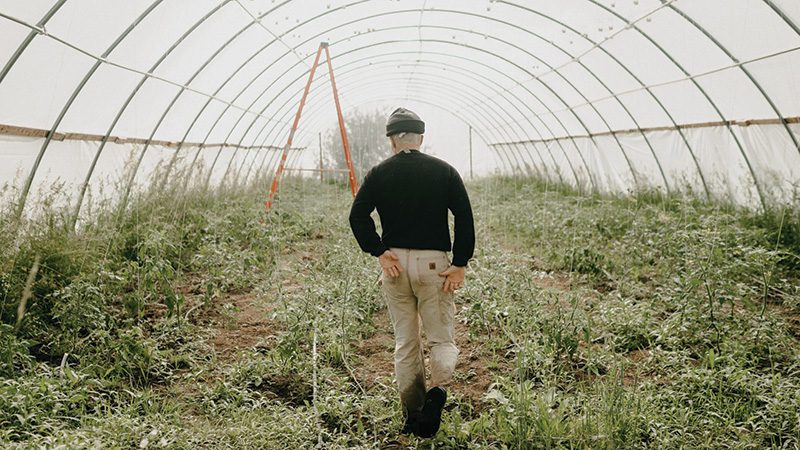Pink Moon Farm preserved
This article was originally published in January 2023

A 24-acre farm in Eatonville has been permanently protected from development. Pink Moon Farm, founded in 2016 by Grayson Crane, produces organic vegetables, eggs, Icelandic sheepskins and locally spun yarns, and grass-fed lamb.
It’s the 29th farm conserved by the Washington Farmland Trust, bringing the total amount of land protected by the nonprofit to 3,036 acres. And it’s another small step supporting younger and independent small farmers in an era where the average farmer is age 57 and land prices out of reach.
Though Crane’s grandparents had farmed in Maine long ago, Crane initially fell into farming 12 or 13 years ago in Ontario, simply “looking for a job.”
But “I loved the work, I loved producing food, I liked the physicality of it, the intensity,” the 35-year-old said. A long-term career wasn’t what they expected, especially after moving to the University of Washington to earn a master’s degree in geography. Yet they realized in the end, “if I could make it work, I really loved farming.”
Pink Moon came after years working through the nonprofit Viva Farms incubator and four years at Mother Earth Farm in the Puyallup Valley. Buying the farm in 2016 “felt like a big, big stretch then for me, financially and personally.” Even that stretch was possible because Crane was employed by a nonprofit at the time, not self-employed, which would have been a significant barrier for bank loans. They’ve been thinking a lot in turn about how many generations lived on the land who did not have even their level of opportunity, “Indigenous folks who lived here much longer than me who again, don’t have the same access to legal ownership,” they said. Pink Moon is on historic Nisqually land, and its website says it’s “privileged to continue stewarding and working with this place.”
With years of working in vegetable production, Crane felt comfortable with “the cash flow, the production, all the ins and outs” with that aspect of farming. But they also hoped to bring in animals to see “if we could operate the farm as more of a closed loop. Obviously that’s not totally possible, we live in a very interconnected world—but maybe we could integrate those things better together, limit our off-farm inputs” and the accompanying bills and reliance on industry.
Enter Icelandic sheep.
Beyond the meat and wool, the grazing herbivores are useful living mowers and blackberry clearers in more riparian areas of the land. “We don’t have to buy any off-farm compost, which is awesome,” Crane said.
The daily work of the farm is deeply satisfying, the financial juggles less so. It’s involved “all these chess moves” to scale the business plan and finance improvements and figure out “How do I make a living wage and pay the people working for me well,” mostly crammed into the four-month off-season.
For instance, farmers have to front the money for many county or federal cost-sharing programs and then get reimbursed after the fact, Crane said. “That was just totally out of my financial ballpark. We’re talking about field fencing, that’s upwards of $40,000…Unfortunately in the system we’re in, it takes money to make money.”
The trust’s conservation allows them to “think and make better informed decisions, not just about our life but the future of this land and this farm business.”
Improvements they can plan for now include major steps like infrastructure for winter vegetables, which will allow the farm to employ year-round workers. They recently completed the new fencing, “things that are just life-changing in terms of stress…We had like five strands of barbed wire around the property (before). Sheep, dogs, anything will blow through that with a smile on its face. Having a good fence, I don’t even know what new things I’ll be able to think about and do now that I’m not worried about that.”
Farming to Crane is “care work,” the trust said in a press release, and they are grateful to the Nisqually tribe for efforts to preserve and steward the region. The farmland was protected in part through the Pierce Conservation District, the Washington State Conservation Commission, and the Pierce County Conservation Futures Program.
The nonprofit trust was founded in 1999 as the PCC Farmland Trust.
To order products from Pink Moon Farm or to learn more, see PinkMoonFarm.org. It offers a CSA and is also at the Capitol Hill Farmers Market in season.
